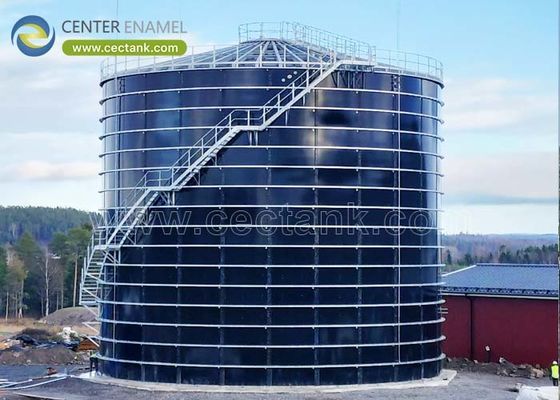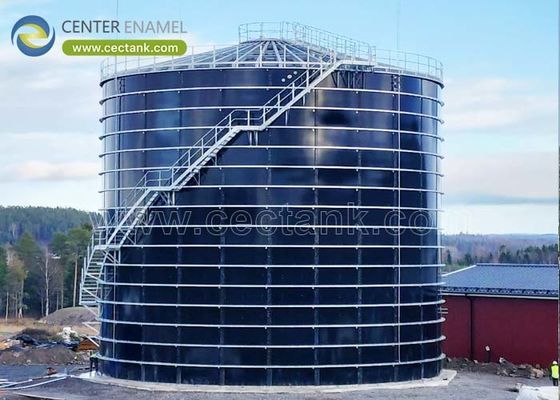-
Glass Fused To Steel Tanks (419)
-
Stainless Steel Tanks (410)
-
Fusion Bonded Epoxy Tanks (424)
-
Galvanized Steel Tanks (321)
-
Aluminum Dome Roofs (872)
-
Wastewater Storage Tanks (226)
-
Welded Steel Tanks (297)
-
Pressure Vessels (295)
-
Anaerobic Digester (201)
-
Industrial Water Tanks (349)
-
Glass Lined Steel Tanks (180)
-
Bolted Steel Tanks (181)
-
Sludge Storage Tank (115)
-
Biogas Storage Tank (173)
-
Leachate Storage Tanks (133)
-
Agricultural Water Storage Tanks (179)
-
Fire Water Tank (166)
-
Grain Storage Silos (130)
-
Biogas Projects (349)
-
Wastewater Treatment Projects (270)
-
Double Membrane Roof (223)
Glass Fused-to-Steel Anaerobic Digestion Tanks for Industrial Wastewater Treatment
| Place of Origin: | China |
| Brand Name: | CEC TANKS |
| Certification: | ISO 9001:2008, NSF - 61 , AWWA D103 , OSHA , BSCI |
| Model Number: | W20160831001 |
| Minimum Order Quantity: | 1set |
| Price: | $5000~$20000 one set |
| Packaging Details: | PE poly-foam between each two steel plates ; wooden pallet and wooden box |
| Delivery Time: | 30 days after deposit received |
| Supply Ability: | 60 sets per month |
|
Detail Information |
|||
Product Description
Glass Fused-to-Steel Anaerobic Digestion Tanks for Industrial Wastewater Treatment: A Sustainable, High-Performance Solution
In an era when sustainable industrial practices and efficient wastewater treatment are more crucial than ever, Shijiazhuang Zhengzhong Technology Co., Ltd (Center Enamel) leads the way with our Glass Fused-to-Steel (GFS) Anaerobic Digestion Tanks. Engineered with over 30 years of experience and state-of-the-art GFS technology, our tanks offer a robust, reliable, and eco-friendly solution tailored to the challenges of industrial wastewater treatment and biogas production.
At Center Enamel, our aluminum geodesic dome roofs are designed to meet international standards and offer superior protection against the elements, as well as corrosive substances and harsh weather conditions. These roofs are particularly beneficial for tanks storing oil, gas, water, chemicals, and other valuable or sensitive materials.
| Configuration of Customized Storage Tanks | ||||
| Storage tanks | Volume | Roofs | Application | Design Requirements |
|
GFS Tanks SS Tanks Fusion Bonded Epoxy Tanks Galvanized Steel Tanks Welded Steel Tanks |
<1000m³ 1000-10000m³ 10000-20000m³ 20000-25000m³ >25000m³ |
ADR Roof GFS Roof Membrane Roof FRP Roof Trough Deck Roof |
Wastewater Treatment Project Drinking Water Project Municipal Sewage Project Biogas Project Fire Water Storage Project Oil Storage Project |
Water Supply & Drainage System Seismic Design Wind Resistant Design Lightning Protection Design Tank Insulation Design |
WasteWater Treatment Project Equipment Supply
| Pretreatment Equipment | Resource Utilization System | Sludge Treatment System | Other Equipment |
|
Mechanical Bar Screen Solid-liquid Separator Submersible Mixer |
Gas Holder Boiler System Boost Fan Biogas Generator Torch System Dehydration and Desulfurization Tank |
PAM Integration Dosing Device Screw Sludge Dewatering Machine Slurry Separation Centrifuge |
Sewage Pump Mud Scraper Submersible Sewage Pump Three-phases Separator |
Unmatched Durability and Corrosion Resistance
Our GFS Anaerobic Digestion Tanks are manufactured by fusing a layer of high-quality glass enamel onto specially pretreated steel plates at temperatures exceeding 850°C. This process creates a smooth, non-porous surface that:
Delivers Exceptional Corrosion Resistance: The dual-layer enamel coating (0.25–0.40 mm thick with an adhesion of 3,450 N/cm) protects the steel from the aggressive chemicals and acidic or alkaline conditions often encountered in industrial effluent. This ensures a service life of over 30 years with minimal maintenance.
Ensures Structural Integrity: The glass fused-to-steel method guarantees that the tanks maintain their integrity under harsh environmental conditions—essential for long-term operation in demanding wastewater treatment applications.
Optimized Design for Efficient Anaerobic Digestion
The design of our anaerobic digestion tanks has been meticulously optimized to support efficient biological reactions. Key features include:
Modular Bolted Construction: The pre-engineered, modular panels enable rapid on-site assembly and offer flexibility for future expansion. This design minimizes installation time and labor costs while allowing customization to meet varying process capacities—from as small as 20 m³ up to 60,000 m³.
Smooth, Easy-to-Clean Interior: The non-porous glass enamel lining not only resists corrosion but also prevents the accumulation of sludge and organic build-up, thereby enhancing the efficiency of biogas production and simplifying routine maintenance.
Environmental and Economic Advantages
Our Glass Fused-to-Steel Anaerobic Digestion Tanks are more than just storage units—they are a strategic investment in sustainable industrial wastewater management. Benefits include:
Renewable Energy Production: Through the anaerobic digestion process, organic contaminants in wastewater are converted into biogas—a renewable energy source that can help offset operational costs and reduce carbon footprints.
Reduced Sludge Generation: The efficient digestion process minimizes sludge production, lowering disposal costs and environmental impact.
Cost-Effective Lifecycle: With low maintenance requirements and a durable design, our tanks reduce long-term operational expenses and offer an excellent return on investment.
Scalability and Customization: Whether for municipal sewage treatment, industrial processing, or agricultural wastewater management, our tanks can be tailored in size, roof design (options include glass fused-to-steel roofs, aluminum trough deck roofs, geodesic dome roofs, or double membrane roofs), and color to perfectly match your facility’s requirements.
Commitment to Quality and Global Standards
Center Enamel is proud to be recognized as the pioneering manufacturer of Glass Fused-to-Steel tanks in Asia. Our products consistently meet or exceed international certifications such as ISO 9001, AWWA D103, NSF/ANSI 61, and ISO 28765, ensuring that every tank is built to the highest standards of safety, performance, and environmental compliance.
A Trusted Partner for Sustainable Wastewater Treatment
For over three decades, our expertise in GFS technology has empowered industries worldwide to overcome the challenges of wastewater treatment and organic waste management. By choosing Center Enamel’s Glass Fused-to-Steel Anaerobic Digestion Tanks, you are investing in a solution that not only addresses today’s wastewater challenges but also supports your company’s long-term sustainability and energy recovery goals.
Discover the Difference:
Contact our expert team today to learn how our innovative, durable, and eco-friendly anaerobic digestion tanks can transform your industrial wastewater treatment process and contribute to a greener, more efficient future.




